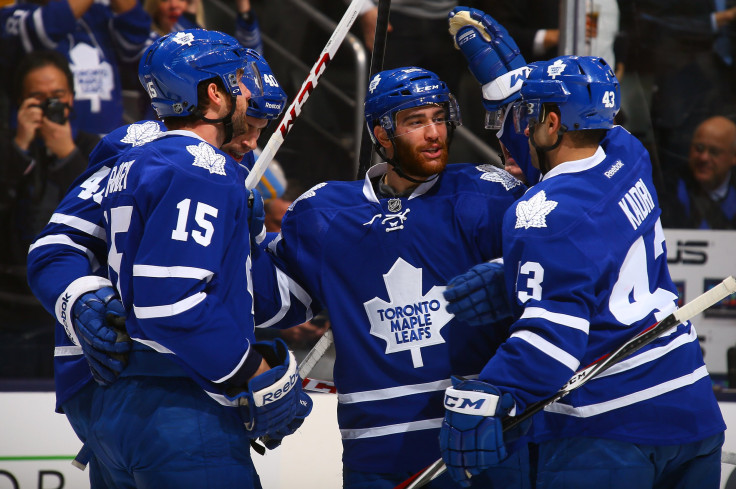Toronto Maple Leafs Hope Analytics Can Help End Cup Drought

Call it Moneypuck. The Toronto Maple Leafs have made the playoffs just once in the past 10 years and haven't held the Stanley Cup since 1967. In hopes of ending the futility, the franchise, one of the National Hockey League’s most historic -- and valuable -- is taking a page from Oakland Athletics’ General Manager Billy Beane and his stats-obsessed peers in North America’s other pro sports.
The Leafs didn't acquire a center to set up sniper Phil Kessel, or a goaltender with a real track record as a starter (apologies to incumbents Tyler Bozak and Jonathan Bernier). Rather, the blue-and-white’s latest addition is a software program.
The Leafs have struck a three-year partnership with analytics specialist SAS, of Cary, North Carolina. SAS will supply the team with technology that can interpret and make sense of so-called Big Data -- vast amounts of information that would be impossible for any individual to digest in a reasonable timeframe.
SAS software will help Leafs personnel gather and interpret newly in-vogue stats like Corsi (the number of shots a player’s team generates while he's on the ice), Fenwick (similar to Corsi, but doesn't include blocked shots) and QualComp, which weights a player’s stats based on the quality of the opposition. The data can generate a more complete picture of performance than basic statistics like goals, assists, or even plus-minus -- a measure of even-strength goal differential for a given player.
“It’s all about having a skill set and desire to dig a bit deeper than what you can see with the naked eye,” Tom Renney, former head coach of the New York Rangers, Vancouver Canucks and Edmonton Oilers, said in an interview with International Business Times.
Analytics is taking pro sports by storm. Beane’s use of advanced stats like sabermetrics in drafting players that helped get the small-budget A’s to eight playoff appearances in 14 years lit the spark. Most teams in the National Football League and National Basketball Association now routinely use advanced software to measure performance.
“This is something everyone wants to do and they’re just now figuring out how to go about it,” Suzanne Clayton, marketing manager for communications, media & entertainment at SAS, said. Clayton said sports analytics is a lucrative new market for software companies. SAP, Oracle and International Business Machines also have offerings. Big Blue provides analytics packages for all four of tennis’ majors -- the U.S., French and Australian Opens, and Wimbledon.
Hockey has been slower than other sports to embrace the technology, in part due to the nature of the game. “It’s impulsive, spontaneous and fast, and there’s a lot of heavy contact," Renney, now president and CEO of Hockey Canada, which oversees the country’s Olympic and national teams, said. "At times it’s difficult to react with anything more than your gut.”
But interest is growing. The Los Angeles Kings relied heavily on analytics during the team’s run to the 2014 Stanley Cup championship. Scouts are also starting to use the technology. That only makes sense, Marshall Davidson, a pro scout with the NHL's Columbus Blue Jackets, said. "Teams are going to invest a lot in these players, so they will use every tool that's available to help evaluate that talent." Davidson, in an interview, said that technology is only one part of the scouting equation, "but it can validate and in some cases go beyond what you are seeing on the ice."
The prevalence of gadgets throughout society is one reason why hockey is now on the bandwagon, Renney said. “There are iPads on the benches now, there’s quick and easy access to everything you want. But what you don’t want is to analyze the game to a standstill.”
In Leafland, analytics has been all but heretical until this season. But new hockey operations president Brendan Shanahan has set a new tone. One of his first hires was assistant general manager Kyle Dubas, a 28-year-old wunderkind who embraced high tech during his stint as GM of the Ontario Hockey League’s Sault Ste. Marie Greyhounds. The Leafs on Tuesday also named Mark Hunter, GM of the OHL's London Knights, as director of player personnel.
“Hockey is where baseball was more than two decades ago,” Dubas recently told the Hockey News. “We’re just getting rolling on this thing here, we’re a long way from the finish line.” Or, as the case has been far too often for the Toronto Maple Leafs, from the goal line.
© Copyright IBTimes 2024. All rights reserved.












